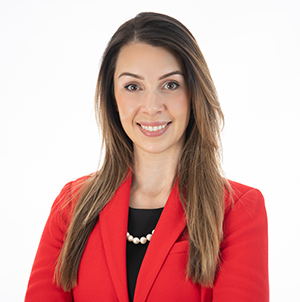
Daniela Piemonte
Senior Vice President, Relationship Manager, PNC Business Credit
Daniela Piemonte began her career at PNC Business Credit as a field examiner in 2011, transitioning to portfolio management in 2015. Currently, she manages 8-12 client relationships across a variety of industries and sizes, including three large, multi-bank syndicated transactions.
Daniela has demonstrated strong initiative, exceptional performance, and independent leadership, successfully working through turnaround and workout situations in her portfolio. She has a knack for client relations, always putting her customers first and understanding their requests and needs.
One of Daniela’s passions is mentoring and helping to develop junior personnel. She feels strongly that great mentors have helped her rise to the occasion over the years, and she hopes to be able to pay that forward to the next generation. Daniela volunteers her time with the WISF Event Planning Committee and helped launch the Chicago chapter of PNC’s Emerging Professionals Employee Business Resource Group, even serving as a past president. In 2019, Daniela was nominated for the prestigious PNC Performance Award and was one of 25 national finalists. Furthermore, Daniela has been recognized as a Top Relationship Manager two of the last three years. She earned her bachelor’s degree in finance & management from DePaul University.
What is the best professional advice you have been given and how have you implemented it?
Always keep learning, stay humble, take criticism with pride, and continue moving forward towards your goals. As an emerging professional, it is easy to want to quickly move up the corporate ladder and focus on the next best thing. However, what some miss is the importance of those early development years and making the most of every single opportunity. I am a firm believer that you get out of your professional career and life what you put into them. Two individuals in the same job can have vastly different career outcomes depending on the effort that each puts in and the approach taken. No one person knows everything. Even at this stage of my career, I understand that I don’t know everything, and I am not afraid to ask for advice or to brainstorm with my colleagues/superiors when appropriate. No matter how seasoned you are in your career, there is always room for improvement and learning.
What advice do you normally give to the junior talent you mentor?
Stay curious, volunteer to help on projects rather than waiting to be asked to help, and become an expert in anything that others value. When I first moved to portfolio management, there were a lot of policy changes taking place. Policy is confusing and requires time to learn and understand, so I decided to become the policy expert. My time commitment paid off, as many of the senior relationship managers at the time relied on my expertise and often came to me for policy guidance. I was able to add value, which made the senior relationship managers that much more willing to involve me and help me develop.
What are some negotiation tactics you’ve learned over the years?
Know your audience! You must be able to cater your approach to the person on the other end of the conversation. What I love about my position is the personal relationships that I have built with my clients. Knowing everyone on a personal level makes negotiations that much easier. I have learned to anticipate people’s reactions and their push points. It is important to keep in mind that many times negotiations are a partnership – I am trying to help them accomplish a goal and therefore they are helping me in return. We are not here to take advantage of each other, instead, we are trying to come to a mutually agreeable solution.
With many working remotely or hybrid-style the past few years, what are some work-life balance strategies you’ve stuck with?
It is important to be able to prioritize and understand that not all tasks or events have the same level of importance. There will be days when the job requires more attention and longer hours and there will also be days when your personal life will require increased attention.
The key is to try to stay as balanced as possible and provide the same level of attention, effort, and presence to whichever role you are prioritizing at that moment. Understand that not all days will be equally split. Work/life balance is a fine line, and it requires planning, prioritizing, time management and teamwork – however, it can be accomplished. Prioritize by timeframe and level of importance; decide what must be done today and what can wait a few days.
Professional Development Courses
- Live online classes for ABL and Factoring professionals
- On Demand classes in Appraisals, Factoring, Legal, Workout & Bankruptcy
Learn More

.jpg?sfvrsn=f1093d2a_0)